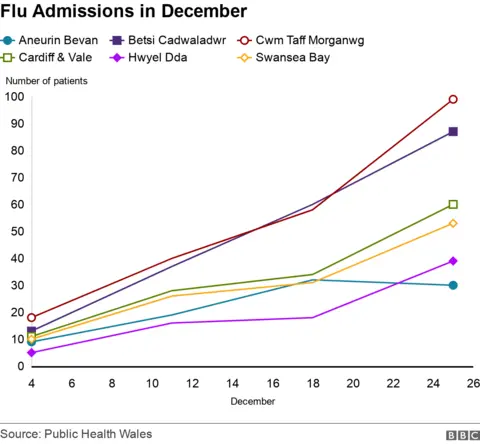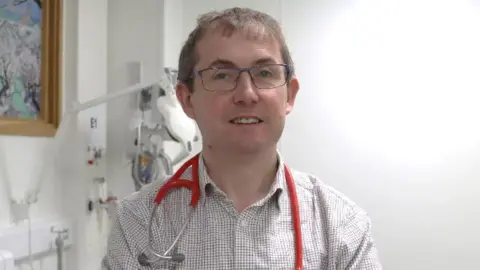NHS Wales: 24 hours in ambulance and night on hospital floor
 BBC
BBCA 63-year-old man had to spend nearly 24 hours in an ambulance and then slept on a hospital floor before he was moved to a ward.
Wayne Erasmus, from Carmarthenshire, had difficulty breathing on Christmas Day, prompting his family to call 999.
He was in the ambulance overnight at Swansea's Morriston Hospital and then moved to the acute medical unit where he spent the next night on the floor.
Swansea Bay University Health Board said it would investigate.
The Welsh government has told health boards to discharge people who are well enough to leave, even without a package of care.
Mr Erasmus, from Hendy, told S4C's Newyddion programme the unit, known as AMU, "was a shambles".
He added: "Everyone was over 60, just roughing it."
He was then told the following day that there would be no hot food, only sandwiches.
"There were too many patients and not enough staff," he said.

"What I find frustrating is the amount of bed blockers there."
Mr Erasmus was diagnosed with acute respiratory distress syndrome and was later transferred to a ward where he received oxygen, a nebuliser and steroids before being discharged on the sixth day.
Since being in hospital, Mr Erasmus has written a letter to the health board complaining about his experience.
He said staff "went above and beyond what was expected of them", but added management needed to put better plans in place when A&E was at full capacity.
A spokesperson for the health board said: "This will be thoroughly investigated in line with our complaints procedure. Therefore it would be inappropriate for us to comment further at this stage.
"We will, however, respond directly to Mr Erasmus once the process is completed."

On Tuesday, the health board urged families of patients waiting to be discharged to take them home as quickly as possible to free up beds.
It said that nearly 280 patients in Swansea Bay hospitals - covering Swansea and Neath Port Talbot - were currently medically well enough to leave - but for "a number of reasons" could not go.
Dr Rhodri Edwards, clinical chairman for medicine, said: "We are asking families to get together and work out if they are in a position to help their relative to go home earlier.
"It would be really helpful if they could find ways to provide some temporary support for a short period, just while the care or reablement packages are being organised.
"This will not only be a great help to the NHS by helping us free up more beds for sick patients who are waiting for them, but it will substantially benefit their relative.
"Hospital really isn't the best place for someone who no longer needs acute care.
"There is a real risk to patients staying on in an acute hospital bed that they will catch an infection from sick patients."
Mr Erasmus' case follows a warning from the body representing all Welsh NHS organisations that the NHS is on a knife-edge in terms of its ability to cope.
Betsi Cadwaladr health board in north Wales has already declared a critical incident.
Darren Hughes, director of the Welsh NHS Confederation, said the NHS was already struggling to cope, and the Christmas period had "tipped it over the edge".
The Welsh government called the situation in the NHS "unprecedented".
